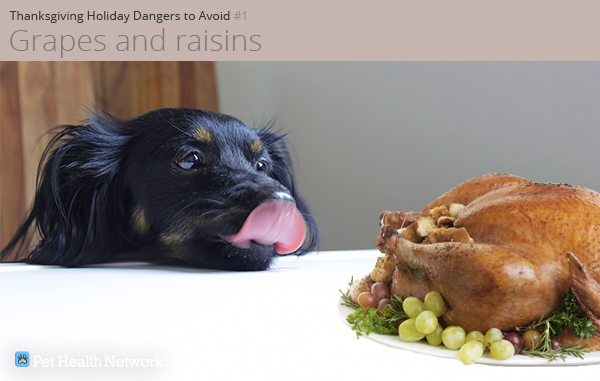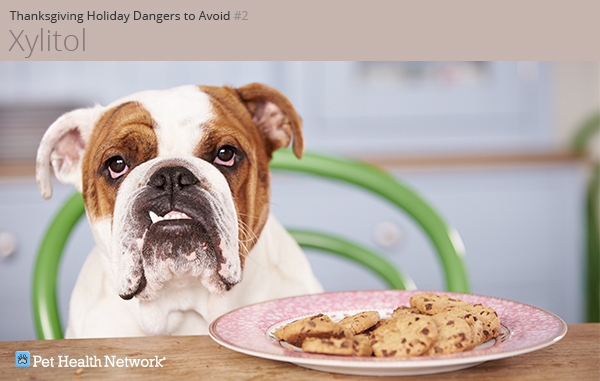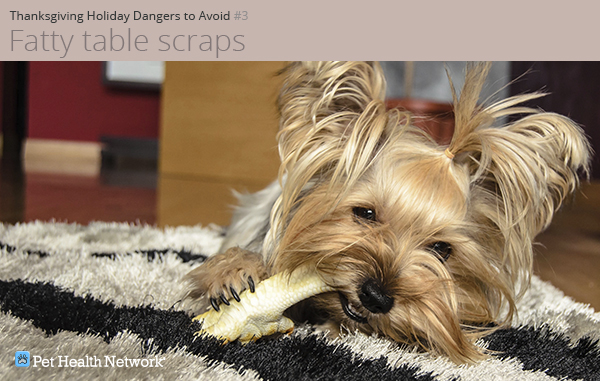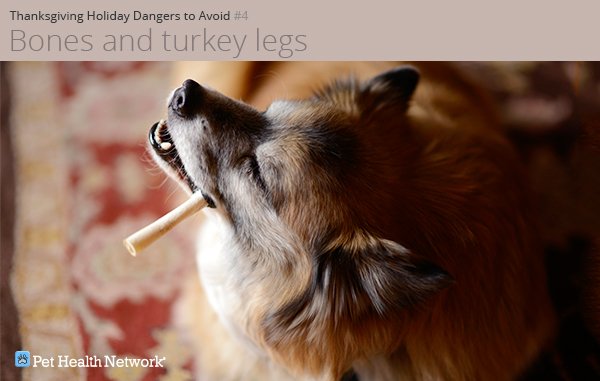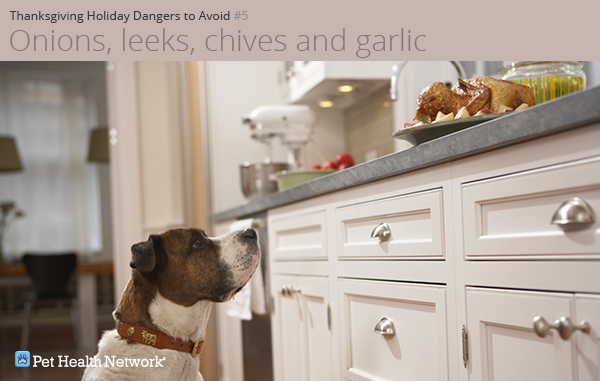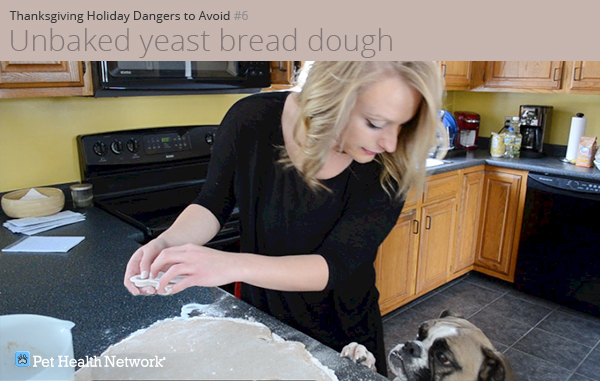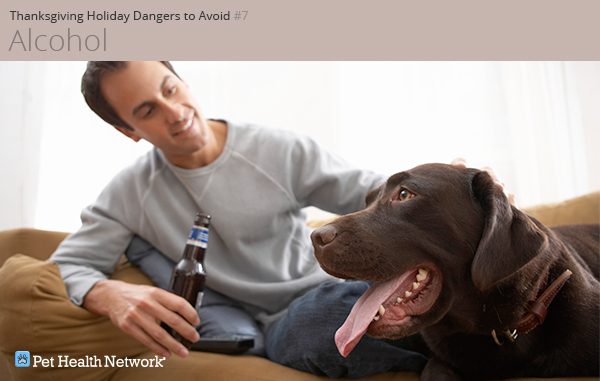Ah, Thanksgiving, a joyous holiday when friends and family join us for football, lounging and all-day tryptophan-filled turkey tasting. The smell of cinnamon, nutmeg, pumpkin pie and turkey all baking in the oven slowly filter through the house, driving you — and your dog — slowly mad. With all of this temptation, it’s tough not to get distracted, but let’s not forget that with delicious human food comes pet risk. As a board-certified veterinary specialist in both emergency critical care and toxicology, I felt it would be a good idea to tell you how to avoid a visit to the animal ER!
Here are a few simple tips to help pet-proof this Thanksgiving holiday (which would make your emergency veterinarian grateful too!).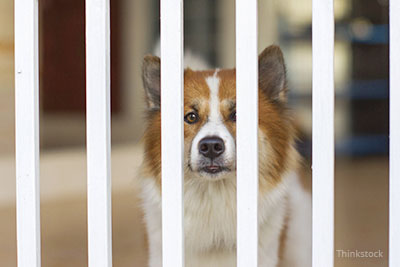 Keep your dog out of the kitchen—or better yet, crate him.
Keep your dog out of the kitchen—or better yet, crate him.
Accidental counter-surfing can result in severe poisoning to your pet, ruining your holiday and causing you shame when you have to induce vomiting in your dog in front of all your friends and family (Always check with your veterinarian or ASPCA Animal Poison Control Center prior to inducing vomiting).
Don’t let friends and family feed your pets
Next, make sure your guests know the house rules: Don’t feed your pets. Your friends and family may not be aware of the common kitchen foods that are quite poisonous to pets. Politely inform all your guests to keep their food out of reach and to ask permission before feeding any treats (particularly if your pet has food allergies).
Dump the trash
Somehow, your dog will find a way to get into it, and the leftover corn-on-the-cob, yummy string that goes around the turkey legs, turkey skin, bones, moldy food, and fatty grizzle all pose a threat to your pet. Potential problems from “garbage gut” include gastroenteritis (e.g., vomiting, diarrhea, abdominal pain), pancreatitis (severe inflammation of the pancreas), a gastrointestinal obstruction, or even tremors or seizures.
The most dangerous Thanksgiving foods
So, what tops the list for the most-dangerous, Thanksgiving foods? Check out my top 7 list here:
Raisins are commonly found in stuffing, baked goods and as snacks. When ingested, these fruits from the Vitus sp. can result in severe acute kidney injury. Signs of poisoning often don’t show up for days, until kidney failure has already taken place.
If you have any calorie-counting chefs in the kitchen (I mean, really, why bother on this holiday?), you may want to verify that they haven’t used any xylitol in the baked goods. Xylitol, a natural sugar-free sweetener, is a sugar substitute used in a ton of products nowadays: baked goods, certain brands of peanut butter, gums, mints, mouthwashes, nasal sprays, chewable vitamins, etc. When ingested by dogs, it can result in a massive insulin spike, causing a life-threatening hypoglycemia (low blood sugar) and even liver failure with higher doses.
While I’m guilty of feeding my own dog table food (and yes, he gets to lick the dinner plate when I’m done), I’m savvy about what is healthy and not. Fatty table scraps like gravy, turkey skin, etc. are potentially dangerous to your dog, as they can result in severe pancreatitis. Certain breeds are especially sensitive, including miniature schnauzers, Shetland sheepdogs, and Yorkshire terriers. Even a piece of bacon can trigger pancreatitis in dogs, so when in doubt, don’t feed it to your dog or cat!
Huge no-no. While you may think you’re giving your dog a treat, you’re actually putting him at risk for a possible foreign body obstruction. I’ve seen the rare dog die from getting a chunk of bone stuck in the esophagus. The bones can also get stuck in the stomach or intestines, potentially resulting in a perforation (or rupture) of the intestines.
Okay, this toxic food is a bit overhyped, as it typically takes a large ingestion to result in poisoning in dogs. That said, when ingested, these common kitchen foods from the Allium sp. can result in oxidative damage to the red blood cells, making these cells more likely to rupture (e.g., hemolyze). Cats are especially sensitive, and can develop a severe anemia (low red blood cell count) from even small amounts. Thankfully, this is typically seen more with chronic ingestion (e.g., when they are eating it for days), but to be safe, keep these out of reach.
About to throw some fresh bread in the oven? Make sure your dog doesn’t eat the raw yeast dough first. When this occurs, your dog’s stomach acts like an artificial oven, making the yeast rise and release carbon dioxide, causing a distended abdomen and potential life-threatening gastric dilatation-volvulus (GDV). Next, the yeast and sugar in the unbaked dough are metabolized to alcohol, which can result in secondary alcohol poisoning in your dog.
As mentioned above, we can see alcohol poisoning from weird sources (e.g., unbaked yeast bread dough, rum-soaked fruitcake, etc.). Likewise, dogs can be poisoned by ingesting alcoholic drinks, so keep the mixed drinks and beer away from your dog. Accidental ingestion can cause severe coma, slowed respiration, and a life-threateningly low blood sugar in your dog.
If you think your dog or cat ingested something poisonous, contact your veterinarian emergency veterinarian, or the ASPCA Animal Poison Control Center for life-saving care, right away. When it comes to any poisoning situation, the sooner you diagnose it, the easier it is to potentially treat, less invasive it is to your pet, and the less expensive it is for you. Now, that’s something to be grateful for.
If you have any questions or concerns, you should always visit or call your veterinarian – they are your best resource to ensure the health and well-being of your pets.

